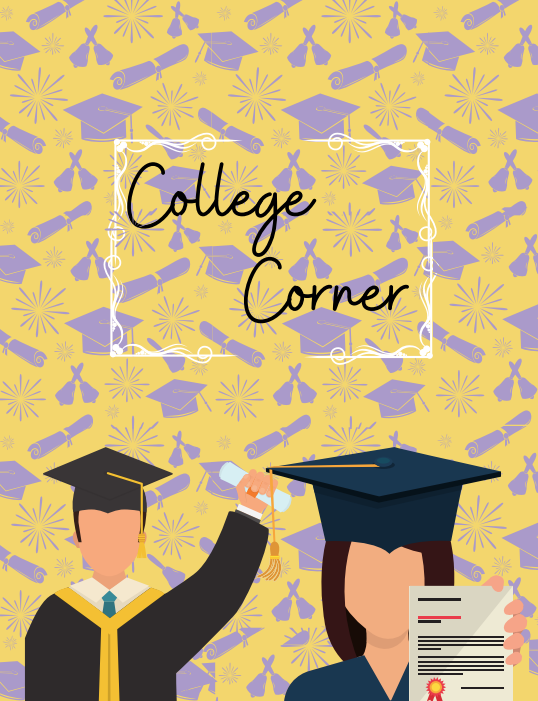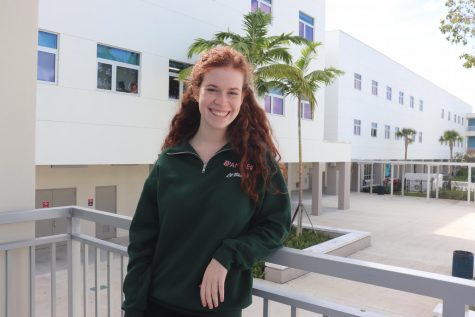College Corner: A Guide To Stress-Free College Interviews
November 15, 2020
Seniors, it’s time! You’ve finished your early applications, you’re wrapping up your regular applications and you have all of the materials needed to sit back, relax and wait for your decisions to come out. There’s just one thing left weighing on you — college interviews.
These interviews may seem scary and like a huge deal that can make or break your application, but don’t worry. They’re actually quite simple, often quite casual and a great way to show schools what makes you, you.
First, research whether the schools you plan to apply to use interviews in their application process. Once you’ve found a school you’re interested in, find out how you can schedule an interview; scheduling differs from school to school.
Once your interview is scheduled and you’ve received a notification with your interviewer’s contact information, stay calm. Prepare by researching the school in question in-depth, and know the academic programs, clubs and other aspects of the school that appeal to you. The more specific, the better. Know what you would like to say about the school when your interviewer asks you the “why this school?” question. This is one of the biggest things an interviewer cares about, as they want to know if you truly would consider attending the school if accepted.
You should also prepare specific questions to ask the interviewer about the school and their experience in particular. The more interested you seem, the better. Questions can revolve around pretty much anything, such as academics, the community on campus and extracurriculars, as long as they remain appropriate and in good taste.
You may also want to research potential college interview questions. It all depends on the school, but some interviewers might ask you questions you did not expect, and a lot of times you can prepare a general answer in advance. The key here is not to sound like a robot, but instead to collect your thoughts in advance so you avoid rambling or taking excessive pauses during the interview. Do not memorize your answer, just have a general response in mind for some key questions.
A day or so before your interview, reach out over email or whatever platform your interviewer reached out to you on. Confirm that the interview is still on and ask them if they would like you to bring anything to the interview, such as a resume.
Before an interview, make sure you look presentable. In normal years, your interview would have likely taken place in-person; this year, it will likely take place over Zoom or another virtual platform. Either way, it remains important to put on business casual clothing and look as presentable as possible. Although you may feel it unimportant to wear business casual clothing from the waist down due to the virtual setting of interviews, you still should, just in case you need to stand for any reason during the interview. This also helps put you in the right mindset for the interview.
Log on to the call a few minutes early. Three minutes early is an acceptable time so as not to keep your interviewer waiting while also not pressuring them to start the call early. When your interviewer lets you into the call, try not to panic. Remember, these are people just like you, who went to the school and have a love for it (hopefully, just like you). They want to help you and want to provide advice about the school.
During the interview, try and remain as conversational as possible. The best interviews are not the quick-fire question and answer ones, but rather the slow, natural conversational ones. Do not think of the interview as an interrogation or even something to stress over; instead, think of it as an opportunity to learn more about your desired school.
The interviews are also a great place to show off your personality a little more than you did in your actual application. Colleges want to know who you are and what kind of a person you would be on campus, so try to allow your real personality to shine through in any way you can. Talk about what interests you and what makes you who you are. You can talk about hobbies, such as arts or sports, that you did not necessarily include as an activity on your application.
A few hours after the interview, email your interviewer thanking them for their time. Mention something you talked about in the interview to remind them of your (hopefully great) conversation and let them know they can reach out to you if they have any more questions. Reiterate how much you want to go to the school in question, and sign your name.
No matter how you feel your interview went, do not stress. Most colleges and universities do not see the interview as a defining factor of your application; in other words, most schools say the interview can only help, not hurt. If you feel the interview went great, that’s awesome! It’s likely to give you a little boost in terms of acceptance to the school. At the end of the day, no matter what happens, you did it! Now all that’s left is to wait for decisions.








